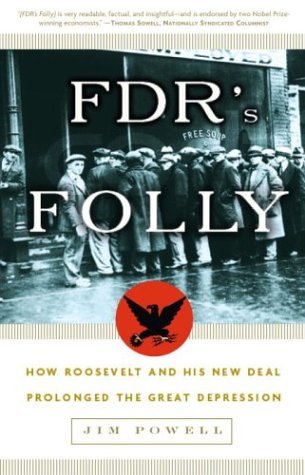Even under a “conservative” President, government entitlements continue to grow. President George W. Bush’s expansion of Medicare to include prescription drugs will add billions to the already overinflated budget. And, despite warnings from Alan Greenspan that Social Security is on the verge of default, neither political party is willing to address the issue. Americans have grown accustomed to the “nanny” state, which has had, according to Jim Powell, a deleterious effect on human freedom, economic well-being, and common sense that few dare to question.
Powell is an historian and a senior fellow at the Cato Institute. His revisionist examination of FDR’s New Deal is an assessment of the major players who formed policy during the Roosevelt era and refutes the lingering myth that government programs, public projects, and monetary regulations are good for society. He shows that America, then and now, would have been better off had the New Deal never been implemented. He argues that laissez-faire capitalism is cyclical in nature, with a natural ability to rebound, and that government intervention effectively stifles initiative and recovery. He convincingly argues that the New Deal prolonged the Great Depression. His impressive display of hard data supports his conclusion.
The current outsourcing of American jobs serves as a prima facie example of how New Deal legislation continues to hurt American businesses. Because of the high cost of American labor, employers are now moving jobs to foreign markets where labor is cheaper. Powell shows this to be the result of minimum-wage legislation and closed-shop union membership, both promoted by Roosevelt. Powell says that these policies deny Americans their fundamental right to freedom of contract and stifle fair-market competition. He demonstrates that, during the Depression, these policies actually increased unemployment, especially among black workers in Southern textile mills. He chronicles the strong-arm activities of unions, the United Auto Workers in particular, that negotiated above-market wages for their members, resulting in General Motors dismissing one quarter of its employees and overall U.S. car production dropping 50 percent between 1937 and 1938. This situation continues today. Recently, union-negotiated healthcare and retirement benefits have raised the cost of G.M. cars $1,400 per vehicle, endangering sales and undermining the automaker’s competitiveness against foreign companies.
Powell argues that the 1935 Social Security Act, the centerpiece of New Deal legislation, was unfair and unsound: a pyramid scheme that takes workers’ money without the adequate compensation that private investment would garner. The actuarial charts tell the sad tale of Uncle Sam’s Robin Hood effort. Social Security contributions are now America’s biggest tax, yet projected returns continue to decline. Even worse, Powell writes, according to the majority opinion of the U.S. Supreme Court in Fleming v. Nestor (1960), nobody has a contractual right to Social Security benefits. Furthermore, Powell argues, high Social Security taxes have caused many employers to cut their workforces, causing even greater unemployment.
Powell’s book provides much food for thought regarding how we arrived at our present indenturedness to big government, including how many New Deal-era U.S. Supreme Court decisions allowed the government to usurp our economic freedoms. He shows that the present caretaker state whittles away at our fundamental liberties and limits productivity. Powell’s book deserves the careful attention of all those involved in public policy and of Christians who support government programs in the belief that they foster social justice: If anything, these programs have hurt, more then helped, the poor and disenfranchised.
[FDR’s Folly: How Roosevelt and His New Deal Prolonged the Great Depression, by Jim Powell (New York: Random House) 274 pp., $27.50]

Leave a Reply